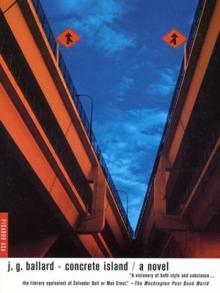- Home
- J. G. Ballard
Rushing to Paradise Page 21
Rushing to Paradise Read online
Page 21
Scarcely mourned, their graves had closed over them like the sea over two sinking stones.
Neil missed them, but at the same time he knew that he himself had been infected by Dr Barbara’s demanding ethos.
Neither Kimo nor Professor Saito had matched the needs of the sanctuary. They were too immersed in themselves, too prone to retreat into their private worlds, and nature had stilled them.
Above all, both were men, and for Dr Barbara being a man was the greatest genetic defect of all.
The water was cold, a death-chill from which only the rubber wet-suit would save him. As he sank below the skiff the dark current reached its icy hands to seize his thighs. A parrot-fish tapped the eye-piece of his face-mask, keen to welcome Neil to its domain, but this corner of the lagoon was empty of life. The sea-snakes and squid, the fish and turtles had left for some more urgent rendezvous, leaving Neil alone in the frozen vault.
Revived by the oxygen in his mask, Neil swam through the deserted garden of the lagoon floor. The parrot-fish followed him, nosing among the mushroom corals and sea-cucumbers.
Fifty feet from him, where the dark water began to seal itself into the deep, a reef-shark swam on some skittish mission of its own.
The garden gave way to a veldt of black sand that sloped towards an escarpment of volcanic rock, lying across the lagoon floor like a barnacled liner.
Neil swam to the ridge, resting his flippers on the encrusted surface, and looked down at the basin below, a submerged vent of the ancient crater that had collapsed in upon itself.
A delirious convention was taking place, a deranged banquet of the fathoms.
Sea-creatures were converging from all sides of the lagoon, almost obscuring the white hull of the Petrus Christus lying on the sandy floor. Its masts slanted through the milky light, and a Dutch ensign waved among the hundreds ofjostling fish that fought frantically to dive through the open hatch into the cabin. A blizzard of animal debris drifted like dream-snow through the water, particles of tissue torn from a trapped carcass within the galley. A pennant of intestine floated on the current, hauled along by a determined blue-fish hoping to find a quiet corner of the lagoon.
A frenzied grouper blundered into Neil, striking his arms and legs. The water clouded, and a last eruption of organic matter gusted through the hatchway of the ketch. Ignored by the fish, a skein of hair attached itself to the rigging, a blonde train flowing from a plate of scalp like the streamer of ajelly-fish. It freed itself from the halyard and slipped away into the darker water, a gliding wraith that sailed towards the closing doors of the deep.
Another yacht had arrived and was dropping anchor half a mile from the shore.
Neil rested over the oars, the wet-suit and oxygen cylinders at his feet. His fever had returned as he broke the surface, and seemed to draw strength from the sun.
Trying to rest his head, he watched a rubber inflatable speed towards the pier, where Mrs Saito stood waiting, hands raised in greeting.
Two fair-haired young women sat in the bows, while their husbands stood in the stern by the engine. One of the men was filming their arrival with a video-camera, panning from the albatross-tipped peak of Saint-Esprit to the line of tents
in the camp and then to the animal pens and the aviary.
The lens rested on Mrs Saito, who smiled over-brightly at the visitors like a nightclub tout outside a tawdry bar in the Ginza.
Her husband’s death had scarcely touched Mrs Saito, and Neil sensed that she had mentally discarded the earnest botanist even before his illness. Professor Saito had been too blinkered for this tough little woman, hiding from the world behind his pebble lenses, trying to come to terms with life by cataloguing its endlessly multiplying varieties.
She caught the inflatable’s mooring line and helped the women ashore, eyes approving their strong teeth, broad hips and rude health, the manageress of a trading house accepting a consign ment of merchandise. She signalled to Dr Barbara, who was watching from the steps of the clinic and now walked at a leisurely pace towards the pier. Trudi and Inger, steering their heavy pregnancies, were already crossing the runway. The van Noort sisters and the New Zealand nurses sat at the tables in the mess-tent, chairs drawn up like seats in a classroom. Here Monique was addressing them, an arm around Nihal’s shoulders as if demonstrating a life-saving drill that involved the concealed parts of the male anatomy.
Determined to warn Dr Barbara that Carline had scuttled the Petrus Christus and drowned the older van Noorts, Neil beached the skiff and lifted the wet-suit and cylinders through the waves. He was exhausted by the long swim from the sunken yacht, and fell to his knees in the ashy sand. The fever burned at the bones of his skull, and an ugly rash covered his arms and thighs. He tried to brush the blisters away, convinced that his skin had already been devoured by the fish that waited for their next banquet.
‘Barbara!’ Mrs Saito shouted. ‘They’re coming, they’re coming!’ Abandoning her visitors, Mrs Saito ran along the pier, knees striking each other in her breathless panic. Her hands gripped the lapels of her shirt, trying to shield her breasts from some imminent assault. She stumbled in the soft sand as she ran past Neil, and steadied herself against the bows of the skiff. Too confused to recognize Neil, she stared down at him as he rested beside his diving gear. Her mouth worked silently like the fish he had seen devouring the van Noorts.
‘They’re… coming!’
‘Who, Mrs Saito? Who’s coming?’
‘Neil? Why are you here?’ She grimaced at him, the planes of her face like the cards in a scattered pack. ‘You fool -the French are coming!’ Neil waited as Dr Barbara reached them and began to reassure Mrs Saito. She embraced the little Japanese, holding her head to her shoulder, and waved to the couples standing uncertainly on the pier.
They lowered their video-camera, in deference to the pregnant women strolling across the runway like a party of expecting angels who had descended from the sky.
‘Barbara… ‘ Mrs Saito swallowed her nose phlegm. ‘The French… they’re coming back…
‘Miko… there’s nothing to fear.’ Dr Barbara brushed the tears from Mrs Saito’s cheeks. ‘Think of the baby..
‘They heard on the radio. Barbara…!’
‘It’s all right. Now wait for me at the clinic.’ Dr Barbara She seemed almost regally calm, untouched by the news that the yacht-crew had brought to Saint-Esprit, as if she had already hung in front of her in a simple clasp, and the restless energy that had driven her through the first unhappy months on the island
‘Well, Neil… no fish today?’
‘I know, Neil. Mrs Saito told me. We’ll have to arrange a ‘But are they really coming?’ P just to test us..
Neil stood up, trying to grip the air as his feet slipped in the sand.
Through his fever he reached for the few words he needed.
‘Dr Barbara, I found the van Noorts’ yacht. I think David scuttled it on the far side of the lagoon. They never sailed for ‘Are you sure, Neil?’ Dr Barbara’s hands ran comfortingly harness. She touched his forehead and pressed his head to her palm. ‘Rest for a moment, Neil. You’ve worked so hard.’
Neil lay against her, feeling an immense relief. He could smell her skin, the
same stale, sweet scent he had inhaled as they slept together in the weather-station, surrounded by the bones and albatross droppings. When she smiled at the visiting couples he noticed the pockets of pus around her lower teeth. He realized aged since coming to Saint-Esprit.
‘Dr Barbara, you’ll have to tell the Dutch girls. Their mother and father are dead.’
‘Try to rest, dear…
‘The fish are eating them, doctor.’
‘Neil, you’ve done so much.’ Dr Barbara stroked his hair, wet with fever.
‘Don’t be afraid - you can stay at the clinic and I’ll look after you. Think, Neil, you’ll be close to your camera towers. You’ll have to tell me what they see.’ Neil listened to her calm heartbeat, its quiet rhythm overtaken by
the gallop of his fever-ridden pulse.
‘Dr Barbara…
‘Yes, Neil?’
‘The camera-towers see nothing.’
The End of Love
BORNE BY THE WIND, the banners floated above the runway, their painted slogans taunting the dusty trees. Neil raised the flap of the mosquito net and squinted through the window of the sick-room, trying to focus his eyes on the rippling messages. His fever had subsided, as it often did in the mornings, and he could read the familiar texts that sermonized the sky.
Life is the Last Sanctuary! Defend Saint-Esprit Now! Say No to Nuclear Testing! Guided by Mrs Saito, the van Noort sisters were climbing a ladder propped against the tallest of the trees. Neil smiled bleakly as he watched their innocent but clumsy efforts, wondering how they had helped their parents to sail the Petrus Christus on the long voyage around the world. As they struggled with the heavy rope the last of the banners slipped from their hands and raced along the runway, draping itself across the bulldozer.
‘Martha…! Helena…!’ Mrs Saito screamed at the pair.
The girls’ endless giggling had driven her into a furious temper, and she shook her fists at them from the foot of the ladder.
‘Silly schoolgirls! It’s not a game! Men are coming for you, brutal men!’
‘Brutal…?’ Keeping her heels out of Mrs Saito’s reach, Helena made large eyes at her younger sister. ‘Did you hear, Martha? We like brutal men…
While Mrs Saito scolded them, Monique strolled past, guiding her large abdomen towards the chairs outside the mess-tent. She leaned against the sun-blanched canvas and surveyed the floating banners with little conviction, as if she had detached herself from Saint-Esprit and whatever doubtful future lay before it.
Her eyes moved from the cemetery where her father lay and lingered upon Neil’s face, framed by the grey shroud of the mosquito net. Neil hoped that she would smile at him, or even show a fleeting irritation, but she watched him without expression, and he sensed that she had already consigned him to the sanctuary’s past along with Monsieur Didier, Kimo and Professor Saito.
Crooning to her baby, Monique waited as Mrs Saito ordered the van Noort sisters to retrieve the banner. Was Monique aware that the bones of their drowned parents lay aboard the scuttled yacht? Within days of their arrival the French soldiers would discover the Petrus Christus, and the deaths would be blamed on everyone in the sanctuary. When Monique brought his evening bowl of tapioca to the sick-room Neil tried to describe the sinister banquet he had witnessed, but like Dr Barbara she regarded the story as just another of his overheated ramblings.
Yet for all his sickness, he alone saw everything clearly on Saint-Esprit. A kind of collective amnesia of the future had settled over the sanctuary, a willed refusal to face the imminent French landing, as if the seizure of Saint-Esprit was irrelevant to the real life of the island. Even Dr Barbara seemed unconcerned.
She sat in her deck-chair under the trees in her private garden, beside the flower-beds she had still to plant, unaware of the final challenge to her leadership that waited below the horizon.
Neil watched her lean back in the chair, idly stretching her neck as she searched the sky for any approaching aircraft. One hand held her trusty spade, while the other rested on the slim hip of the fourteen-year-old Moluccan boy, a favoured guest within her intimate enclosure Nihal hovered beside her, unsettled by Mrs Saito’s incessant shouting. Dr Barbara had prescribed for him a regime of swimming and spear-fishing, and already this had deepened his chest and hardened his thighs and stomach.
Fortunately, no other duties had been assigned to him, and he slept alone in Kimo’s tent.
For whatever reasons, there was a lull in Dr Barbara’s breeding programme.
Though confined to the sick-room, Neil had pushed his bed to the window and kept a close watch on the sanctuary. At night, when his fever was most intense and a frieze of wounded albatross paraded across the ceiling, he called to Dr Barbara as she slept in her office. Muttering to herself, she blundered into the sick-room, and seemed to spring through the trapdoor of Neil’s mind like a demon queen. But at least she slept alone. The thought of the canny Moluccan lying between her breasts so disturbed Neil that jealousy alone had kept him going through the early days when he had almost succumbed to the fever.
Neil wiped his sweat onto the mosquito net, which still carried the scent of Professor Saito’s hair-oil. Trying to forget the botanist, whose little body had impressed its contours into the sodden mattress beneath Neil’s shoulders, he listened to his widow’s tantrums as she supervised the re-hanging of the banner.
This mini-drama she staged at least twice a day, as if keeping alive some archaic form of Japanese theatre with its repertoire of grunts and rages.
Of the original members of the expedition, Mrs Saito alone seemed to dread the prospect of a French return to Saint-Esprit.
The two Swedish couples on the last yacht to visit the island insisted that they had not misheard the Defence Ministry broad cast, panicking Mrs Saito into a frenzy of activity. While Dr Barbara dozed in her garden, and Trudi and Inger helped Monique to prepare the evening meal in the kitchens, Mrs Saito presided over the young women with a regime of barely contained hysteria. Heaps of driftwood and damp ferns now lay at opposite ends of the runway, bonfires to be set alight once the first television crews arrived to witness the French reoccupation.
The two New Zealand nurses were Mrs Saito’s loyal work horses. Dr Barbara assured them that she could look after Neil on her own, and they devoted themselves to strengthening the sanctuary’s defences, helped by the Canadian school-teachers.
Together they painted the protest banners and strengthened the telephone wire around the animal enclosures, the last redoubt to which they would all retreat, defending to the end those few animals and birds which had managed to escape the cooking pot.
Dedicated environmentalists and veterans of campaigns against Norwegian and Japanese whalers, they worked through the rain squalls and enervating heat, only pausing to recharge themselves at Monsieur Didier’s grave.
By contrast, the two Swedish wives took no part in the defence of Saint-Esprit, uncomfortable in the face of Mrs Saito’s kamikaze zeal. They sat beside their sleeping bags in the mess tent, still stunned by the sudden departure of their husbands, who had sailed for Tahiti to gain more accurate news and alert the world-wide network of animal rights activists. Their impul sive departure baffled their wives, who were sleeping ashore at Dr Barbara’s invitation, but she assured them that they had left under cover of darkness to avoid the French reconnaissance aircraft.
No-one, however, was surprised that they had taken David Canine with them.
Mrs Saito and Dr Barbara had long written off the American, sitting like a deranged air-traffic controller in his derelict radio-cabin, unable to feed himself and a burden on the work of others. Soon he would be back in Boston, intimi dated by his womenfolk and preparing his next missionary flight to the Congo. Neil regretted
that he had gone, missing his quirky idealism, his anger at a world that had given him everything at his birth and then, piece by piece, taken it all back from him, draining him of the last vestiges of self-respect.
Secure at last, the protest banners hung astride the runway, their slogans stamped on the sky. In a moment’s silence, everyone surveyed the defiant messages, clearly visible to any low-flying aircraft. But the spectacle was too much for Mrs Saito. Giving way to an attack of anger and panic, she hid her tears behind her hands, pushed away the sympathetic embraces of Inger and Trudi and ran sobbing to the plant laboratory.
From his sick-bed Neil watched her through the glass insula tion door, pacing around the trestle shelves with their trays of obscure fungi, once carefully tended by her husband as part of his quixotic attempt to taxonomize the world. Neil found it difficult to remember the hard-fisted and clear-eyed woman who had helped to build the sanctuary in its earlier days. On the rare occasions that she came to the clinic she wo
uld recoil from the mosquito net, as if surprised to find Neil still lying there. He sensed that Mrs Saito understood the causes of his fever and disagreed with Dr Barbara over its treatment. Once he heard her in the office, urging Dr Barbara to increase the dosage of the medicine she prescribed. But Dr Barbara was caring for Neil in her own way.
As Mrs Saito shuffled around her overheated bower, Neil thought of his child growing in her womb. She had lost confidence in herself, and Neil searched his fuddled brain for some way of reassuring her. He had never persuaded Mrs Saito to approve of him, but perhaps the time had come when she would appreciate his friendship. As a trained botanist she under stood the vast pharmacopoeia of the plant kingdom, and might brew a herbal tea that could cure his fever.
Neil pushed aside the damp mosquito net and placed his bare feet on the floor. He stood up, trying to steady the clinic around himself, but a spasm of nausea made him retch into the bucket beside the bed. He wiped his mouth on the net and tried to smooth his hair, hoping to make himself presentable to Mrs Saito. Too weak to search for his clothes in Dr Barbara’s office, he took Professor Saito’s silk kimono from its peg behind the mosquito door.
Neil stepped through Dr Barbara’s office, past the padlocked food and medicine cabinets that surrounded her spartan bed. He opened the rear door, felt his way down the wooden staircase and set off across the dozen yards to the plant laboratory.
As the glass insulation door closed behind him he shuffled into the grey, foetid air. A scent of rotting blossoms rose from the disordered vegetation, the rancid drupes and seed-pods, a plant hell where deranged orchids grappled for the light. The acrid stench seemed to come from his own head, as if these feverish plants recognized him as one of their own.
He leaned against a trestle table, waiting for his mind to clear, when a fierce hissing emerged from the narrow arbour where he and Mrs Saito had lain together. She was kneeling among the dying fungi, her face like the mask of a demented geisha. As she stared at her husband’s kimono she seemed unable to recognize Neil, and the hissing between her bared teeth became a guttural roar, defying an intruder from the grave.

 High-Rise
High-Rise The Drowned World
The Drowned World The Unlimited Dream Company
The Unlimited Dream Company Running Wild
Running Wild The Day of Creation
The Day of Creation The Wind From Nowhere
The Wind From Nowhere The Complete Short Stories, Volume 2
The Complete Short Stories, Volume 2 Concrete Island
Concrete Island Empire of the Sun
Empire of the Sun The Kindness of Women
The Kindness of Women Vermilion Sands
Vermilion Sands Super-Cannes
Super-Cannes Millennium People
Millennium People The Complete Stories of J. G. Ballard
The Complete Stories of J. G. Ballard Crash
Crash The Drought
The Drought The Atrocity Exhibition
The Atrocity Exhibition The Complete Short Stories: Volume 1
The Complete Short Stories: Volume 1 Miracles of Life: Shanghai to Shepperton: An Autobiography
Miracles of Life: Shanghai to Shepperton: An Autobiography Rushing to Paradise
Rushing to Paradise Chronopolis
Chronopolis Cocaine Nights
Cocaine Nights High Rise (1987)
High Rise (1987) The Complete Short Stories
The Complete Short Stories The Day of Creation (Harper Perennial Modern Classics)
The Day of Creation (Harper Perennial Modern Classics) The Crystal World
The Crystal World